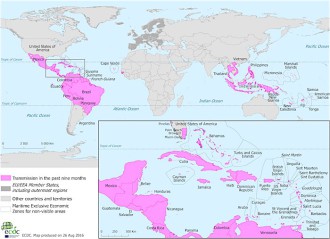Mission Health has confirmed that a patient was treated for the Zika virus earlier this month.
Dr. Chris DeRienzo, chief quality officer for Mission, said in a statement released by the hospital that the person was treated and released during the weekend of Aug. 13.
“The virus was not contracted locally,” the statement said. “The patient has been discharged. Mission Health officials worked with all relevant state and local public health experts in this case.”
Zika is carried by mosquitoes and spread by their bites, but unlike other mosquito-borne illnesses, it also can be transmitted through sexual contact. The virus can cause devastating birth defects in fetuses if a pregnant woman is exposed, so the national Centers for Disease Control and Prevention recommend couples take extra precaution to prevent its spread. The virus can survive in sperm for several months, and researchers are working on determining its lifespan in other bodily fluids.
Dr. Jennifer Mullendore, medical director of the Buncombe County Department of Health and Human Services, called Zika “a new twist” in mosquito-borne illnesses.
The patient, Mullendore said, was not from Asheville but was visiting. Federal law prevents the release of any more information about the patient.
“It means we will have to follow CDC guidelines on the prevention of sexual transmission,” Mullendore said.
Those CDC guidelines are:
· Condoms and other barriers can reduce the chances of getting Zika from sex.
· Barriers that prevent passing Zika through sex include male and female condoms and dental dams.
· Dental dams are latex or polyurethane sheets used between the mouth and vagina or anus during oral sex.
· To be effective, condoms should be used from start to finish, every time during vaginal, anal and oral sex.
· Not sharing sex toys can also reduce the risk of spreading Zika to sex partners.
· Not having sex eliminates the risk of getting Zika from sex.
Kate Murphy, spokeswoman for the N.C. Department of Health and Human Services, said no cases of sexually transmitted Zika have occurred in the state as yet.
To prevent transmission by mosquito, use mosquito repellent when going outdoors and make sure all receptacles with standing water, where mosquitoes lay their eggs, are tipped and emptied.
For more information about Zika and its prevention, visitcdc.gov/zika/index.html.







I look forward to the next ‘alternative healing’ article featured here where Zika can be treated by Zumba or by riding on the LaZoom bus.
https://www.youtube.com/watch?v=GT_2K4ddG7g